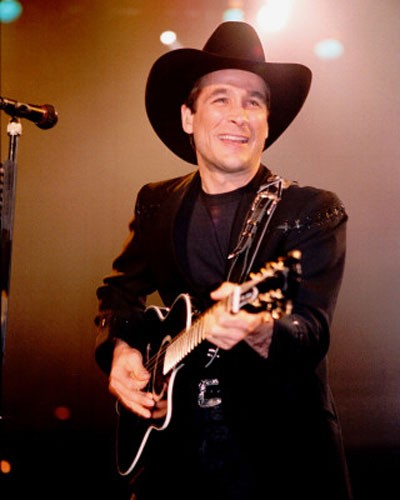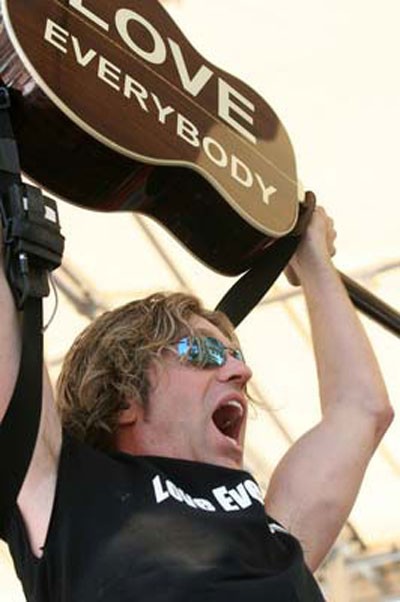Let freedom ring, let the white dove sing;
Let the whole world know, that today is a day of reckoning.
Let the weak be strong, let the right be wrong.
Roll the stone away, let the guilty pay ...
It's Independence Day.
-- from Martina McBride's hit "Independence Day," by Gretchen Peters
The cowboy sitting in the studio at WSOC in Charlotte looks like Dubya. Small, shiny beads for eyes, a permanent squint and a country smile that says, Everything's all right. Don't worry so much. Wearing a snug denim jacket and black cowboy hat that fits over his graying sideburns like it's glued on, Clint Black starts a song. His words match his outfit:
"All my life I've been a cowboy in my heart ..." His Texas twang wavers as he croons the chorus: "The code of the West was black and white, the good guys and the bad. You would always know who's wrong or right by the color of their hat." Then the words turn political: "We could use a few more cowboys here today. A few more days of reckoning and a lot more hell to pay. Where that debt is owed there ain't no middle ground."
The veteran country singer is on WSOC's Tanner in the Morning Show promoting his CD Drinking Songs and Other Logic, released late last year. On the show, Black cannot say enough about his wife and daughter. He tells a childhood story about hunting for poisonous snakes in the east Texas bayou country. He's one mention of the Almighty away from covering all the bases.

- Clint Black
- Martina McBride
Clint Black could not embody modern country music's brand any better. That makes sense. After all, Black was the first country star to mass-market the music's post-1980s hat-act image. Before Garth Brooks rode Black's wake to success, the singer spearheaded mainstream country's big bang in the early 1990s. More than a decade later, country music is in another boom phase, a larger one this time augmented by the mass popularity of other aspects of Southern culture: Larry the Cable Guy's cornpone humor on Comedy Central, NASCAR's victory among the suit-and-tie set.
In a political era in which the United States has been divided into red and blue, more and more Americans are tuning in to the soundtrack of the South. In cities across the nation, country radio stations are consistently in the top of the Top 5, says WSOC's Operations Manager D.J. Stout (in a recent ratings period, Charlotte's two country stations were ranked first and second). There's no question country's out of the back roads, but does its crossover into the mainstream say anything about its content? Will country's conservative core soften as the genre enters more politically correct territory?
One of the first contemporary mainstream country artists to push the political envelope in terms of lyrical content was Martina McBride, who performs at Bobcats Arena on Saturday, April 1. With her 1993 hit "Independence Day," McBride built a reputation as a singer of progressive subject matter during a rather staid era in country music. The song is about an abused woman who burns down her house with herself and her husband inside, told from the point of view of an 8-year-old girl.
Gretchen Peters, the writer of "Independence Day," has penned songs for Faith Hill, Neil Diamond and many others. Peters says she wrote "Independence Day" as an outlet to express her outrage over domestic abuse. The jumping-off point was the memory of her parents' divorce when she was 8, which gave her insight into some of the song's themes, although she had never experienced domestic abuse.
"At the time, it was seen as really edgy," Peters says, but she views the song as just another in a great tradition of country songs that lean to the left, from Johnny Cash's anti-Vietnam war ballad "Man in Black" to Henson Cargill's civil rights anthem "Skip a Rope." "Look at [the line] 'I shot a man in Reno just to watch him die.' Some of Dolly's really gothic, unwed-mother pregnancy songs. Loretta Lynn tackled every possible domestic subject, including birth control. Or [Tom T. Hall's] 'Harper Valley P.T.A.'"
Still, Peters says that by the early '90s country music was neck deep in a sanitized goody-goody phase, and she was pretty sure "Independence Day" wouldn't be cut. Murder/suicides weren't being sung about, let alone a song about a woman standing up for herself. McBride took a chance on it, putting the song on her second album, The Way That I Am. During that period, women weren't getting much airplay in country, another card stacked against Peters' song. She says only one or two female artists were being played on country stations an hour, and those were the cookie-cutter types.
McBride's fist hit from the album, "My Baby Loves Me," also written by Peters, was one of the dime-a-dozen love ditties. When the label finally decided to push "Independence Day" well after the album's release, the song languished near the bottom of the charts. Many country stations wouldn't play it. Peters was right; it was too progressive for the mainstream.
Then something happened. Nicole Brown Simpson was murdered, OJ was on trial and the issue of domestic violence became a hot topic. "Independence Day" suddenly took off and, Peters says, "Martina became a symbol for domestic abuse." McBride embraced the role, campaigning for women's rights.
The problem is, the lyrics were reinterpreted, often intentionally, as a flag-waving anthem. After all, the "Independence Day" of Peters' song takes place on July 4. In the same way Ronald Reagan appropriated Bruce Springsteen's protest song "Born in the U.S.A." as a jingoistic conservative ballad, so did some conservative country fans with "Independence Day."

- photorazzi
- Big Kenny of Big & Rich
It was easy to do. Look at all the patriotic buzz words in the refrain: "Let freedom ring/Let the white dove sing/Let the whole world know that today, is a day of reckoning ..."
Despite those hot-button words, Peters believes most people understand what the song is really about. Thousands of women have written both Peters and McBride to tell them how the song gave them the strength to leave abusive relationships,
She acknowledges, though, that a certain percentage of country fans might think "Independence Day" is just another rah-rah, go-go USA song. Indeed, arch-conservative Sean Hannity opens his FOX news show to the chorus of "Independence Day." The song was also played constantly after 9/11.
Ned Sublette, a music journalist, musicologist and singer-songwriter from Lubbock, TX, says, "It's the game songwriters play. If you're manipulating a familiar symbol, you're challenging someone to listen." But ultimately, he says, "songwriters aren't writing cryptograms to be deciphered. They ask questions more than anything else."
One question Martina McBride's fans were left with was: What happens to the mother at the end of "Independence Day"? According to the "frequently asked questions" section on the singer's Web site: "Martina says her interpretation is that the mother does NOT die and that she couldn't have recorded the song if she felt that the mother dies."
It seems McBride herself missed the meaning of her own big hit. While Peters did leave the question up for ambiguity, she says in her mind the woman does kill herself. (It seems quite straightforward in the lyric, "By the time the firemen come, they just put out the flames and took down some names and sent me to the county home.") Suggesting that the woman in the song was bad to kill herself and leave her child an orphan is moralizing, according to Peters. "The whole point of the song is in the lyric, 'I'm not saying it's right or it's wrong,'" Peters says. "That's the point. Don't judge people who are in situations you can't even fathom."
If Martina McBride is viewed as progressive, it's only in comparison to the Clint Blacks and Toby Keiths of country. For an idea of what kind of fan base McBride has, the third most frequently asked question on her Web site is, "Do you and John have any children?"
What's more, on McBride's latest CD, Timeless, honky-tonk pioneer Buck Owens wrote in the liner notes: "If one could see Martina's heart I'm sure you'd find it to be red, white, and blue. Our kind of music, present and future, is in good hands."
Gretchen Peters stopped listening to mainstream country music five years ago. "My sense of it is that like a lot of American pop culture, it's just become junk food," she says. "There's not a lot of nutritive value in any it."

In the mid-2000s, the politically ambiguous outlaw seems to be making a comeback in mainstream country, according to WSOC's Stout and music director Rick McCracken. Fans are requesting Johnny Cash more than they have since before the country icon became a hero to the alternative crowd. And Hank Williams III's Straight to Hell, released this month, is "as gutbucket as country can be. That sound is something that young people are hungering for," says McCracken. Williams, the grandson of the legendary country pioneer and son of outlaw Hank Jr., divides his live shows between pure country and hard-core punk.
Other pioneers said to be on the progressive side of country are Big & Rich, the duo that brought "Redneck Woman" Gretchen Wilson to stardom. At the duo's recently performance at Verizon Wireless Amphitheatre, they were very open about their liberal political views. During songs, images flashed of blacks and whites working together, and the duo talked to the predominantly white, mainstream-country crowd about the importance of tolerance and diversity.
But there's a difference between what Big & Rich say at their shows and what they say in their songs. Take this line from their 2004 hit "Save a Horse Ride A Cowboy": "And I wouldn't trade ol' Leroy/or my Chevrolet for your Escalade/or your freak parade/I'm the only John Wayne left in this town."
Big & Rich's views swing far to the left when compared to lyrics from Clint Black's 2003 single "Iraq & Roll": "Iraq, I rack 'em up and I roll/I'm back, I'm a high tech GI Joe/I got Infrared, I got GPS/I got that good ole' fashioned lead/No price is too high for freedom/you better be careful where you tread."
WSOC played "Iraq & Roll" as well as the many other pro-war songs that came out after 9/11 and the subsequent invasions of Afghanistan and Iraq. But Black contends he has no problem with songs that offer the other view. "The greatest thing about our country and the thing that's kept our country strong is having the opposing view," he says. "If we didn't have that we'd swing all the way to the left or all the way to right and never come back."
Black can say that. But some country acts have paid dearly for offering opposing views. Take what happened to the Dixie Chicks, who were pulled from country stations nationwide (including WSOC) after singer Natalie Maines said she was ashamed to be from the same state as Bush.
Peters, who's first album of her own, The Secret of Life, is filed in the country aisles, drives a car with a bumpersticker that reads: "Natalie Maines was right." Peters compares the banning of the Dixie Chicks with the record burnings that occurred mainly in the South after John Lennon made the offhand statement that the Beatles were bigger than Jesus. "I think it was criminal," Peters says of the Dixie Chicks debacle. "It was one of the most shameful moments for our town [Nashville] and our industry. I'm ashamed. I think she had the right to speak her mind and she was crucified for it. It's disgusting."
Gradually, some Chicks classics crawled back onto WSOC until mainstream country fans caught wind of a January 23 Entertainment Weekly interview with Maines in which she continued to express her opinions. "For me, to be in country music was not who I was ... I guess I was ignorant to the fact that the stereotypes behind country music were true." Those comments incensed Charlotte listeners and listeners across the country, who called radio stations in droves to complain. WSOC left it up for the listeners to vote. "It was overwhelming," says Strout, "like 1000 to 30. The sad thing is, their music is great. But they have, for the most part, offended the country audience."
If WSOC followed the trend in banning the Dixie Chicks, McCracken credits the station for bucking it in 2003, deciding to play Jeff Carson's ultra-Christian song "I Can Only Imagine" (the lyrics "Will I dance for you Jesus?" and "Will I sing Hallelujah?" are repeated throughout). Carson's song had gone untouched by country stations before WSOC began playing it, and the song took off in part because of the Charlotte station's support. McCracken says the same is true for Randy Travis' "Three Wooden Crosses."
The bottom line is that when it comes to extremes, mainstream radio is squemish. But the WSOC experiments show that in country, the Christian right sells and the progressive left doesn't. "Everyone in country music was afraid to recognize that very hard-core Christian element. We jumped out on that," says McCracken. "This whole controversy thing works both ways. We actually did something that was a bit far right and almost considered sacred ground."
Despite left-leaning acts like the Dixie Chicks and Big & Rich and songs such as McBride's "Independence Day," contemporary country is the same as it ever was, according to Kara Edwards, of the Tanner in the Morning Show. Edwards sums it up simply: "It's all about God, country, family, being proud of who you are and where you're from. It's so great we can just pump it and promote it. We can go on the air and be appalled when certain songs can't be sung in a school because of Christ. We can go on the air and go, un-uh."
Before Black arrived at the station, Tanner and his morning crew had played a game with their audience. They asked people to answer the question, "Real men won't do what?"
A woman called in and said, "Buy women personal hygiene." Like most shows, Tanner runs on a delay so the producers can edit out comments they don't like. Tanner and producer Chris Allen made the executive decision to cut out the hygiene answer, opting to air less racy answers like, "Whine about their wives making them wear pink shirts."
"Ewww," said Kara of the hygiene answer. "We don't need that."